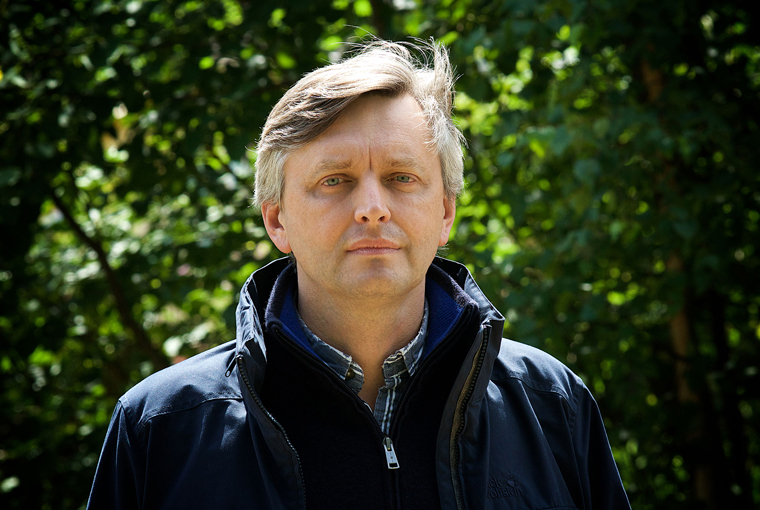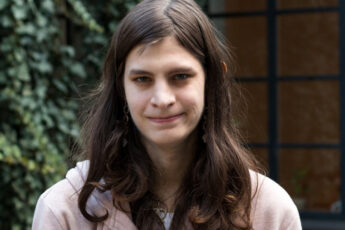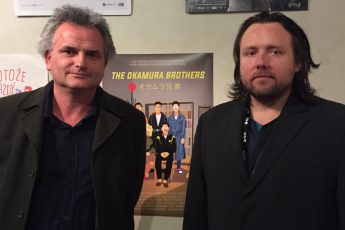
We met Sergei Loznitsa during the Trieste Film Festival (16–24 January), where he presented his latest film “The Invasion” that portrays everyday life during the Russo-Ukrainian war. In Trieste, Loznitsa was also awarded the Eastern Star award for his efforts to build bridges between Eastern and Western Europe. We spoke to Loznitsa about the origin story of his latest film, and discussed wartime cultural politics with him.
Could you begin by telling us how this film came to be, and describe the process of making it? How did you find the people you wanted to portray? Was there a lot of material you didn’t use?
This film was commissioned by ARTE France when the war started. Fabrice Puchault, the director of the documentary department at ARTE France, came to me, asking me to create something in Ukraine, a film or whatever I wanted to make. The only condition was that it had to be set in Ukraine. And I said yes, of course.
We immediately met on 1 March 2022, just a week after the war had started. I told him we can try. I didn’t have any concept or idea yet, but I offered to shoot some episodes from ordinary people’s lives and try and record how the war affected them, how it interfered with their lives, and how they lived under those circumstances. I proposed to shoot episode by episode and we planned to release a few episodes every week.
We started shooting in August due to bureaucratic challenges and continued to shoot every month in different places. I made episode after episode, deciding afterwards on the next location based on what we had already shot. And if there was a chance that the project would finally result in a film, I would make a film. I was working on that basis: first episode, second episode, and then they dictate the next line, the next place where we will shoot.
Finally, we shot for a year and a half in different places in Ukraine, focusing on the so-called “peaceful” everyday life rather than the front lines. I wanted to capture how people tried to survive in these tragic circumstances, which are very hard and unexpectable for a lot of people, and what it was that they encountered on a daily basis.
The last day of shooting was in January 2024. By that time, we had filmed 30 short films, totaling six hours all together. From that material some parts of the short films were used to create one full-length film. All these short films have been released by ARTE France on their website on 14 January 2025. And each of them are different. Every short is a proper film, with a beginning, a main part, and an end. The footage for some of them, maybe a third, is not included in the final “big” film.
So there is both the single, big film called “The Invasion” that ARTE will release, and 28 short films that they have already made available through their online platform. You can watch them there.
Regarding the selection and editing process, what was your method? And how did your approach of working with this material compare to your previous films?
First of all, we used a static camera for all the films from this project. Even the final film only has a static camera – no movement! And in each situation, I had to figure out how to capture the location that I am in, how to make it happen, and what to even shoot. We shot quite a lot of material, maybe 200 hours or something like that. I wanted to give each episode a finished, completed form.
I did not want to have any interviews, just observation. And we can draw our own conclusions after we have observed these people and their lives, once the war is over. This is my general method that I use. The film of course has a rhythm, like poetry. Some episodes have a connection to other episodes because of similar themes or because those themes are being developed.
For example, I show three funerals in the film and they are all different. There is one public funeral and one very intimate funeral, and each of them are different when it comes to perspective and atmosphere. I have this small arch of development in between different episodes. They are connected to one another, adding depth to the film.
The rhythm is evident in the sound as well. The funeral scenes are quite musical, orchestral even, contrasting with the silence emanating from other scenes. As you said, there is not much dialog or interviews.
Yes, it’s an incredibly painful film for me. You can imagine… It’s deeply emotional. Some episodes are impossible to watch without crying because they touch so strongly on what’s happening with my country and with the people that I know. Quite a lot of people from the film world are fighting. I have one friend who was killed at the frontline already.
It is very painful to watch what is happening right now. It is so stupid to have this war happening in the center of Europe. It’s the center of Europe! And I don’t expect anything good from the way that things are currently developing, when I watch how politicians observe this situation and what they are doing. I don’t expect anything good. It’s the biggest European problem that is not being addressed as such.
People didn’t treat it as a European issue, they think it’s some local war somewhere between Slavic tribes. Which is completely wrong because everyone participates in this war with weapons. But we do not count that as participation, which is a strange kind of convention. Because they all participate!
Maybe not openly but this is a matter of convention, to agree that this is not participation. But it is and it means that at any moment this convention could be destroyed. It’s a very dangerous situation. People have hope that the situation will change soon but I myself am not hopeful.
People think that a change in leadership, like a new president in US, could solve it. That after the good guy comes into office, he might solve the situation, like a big brother. This is funny to me…
So what is your hope if not the big brother?
I don’t know of any war that does not end eventually. Better soon than later!
I was struck by the scene in your film in which books were being collected and destroyed…
It is a movement that arose with this war. Different bookstores announce that citizens can bring books printed in Russian. They throw them into the garbage and recycle them as pulp. So you can make toilet paper out of them or whatever.
Quite a lot of books were sent to those recycling places. This includes not only Russian literature or Russian-language literature but also everything translated into Russian, like works by Jack London, Mark Twain, I don’t know, Thomas Mann! I saw Stefan Zweig in the footage. And I recalled that he had written a memoir about the First World War. In this book, he described the situation of German, British, and French culture during the war.
We have seen this before. “Never play Shakespeare in German theaters again!” – “Never play Wagner in the Russian conservatory, or the operas of France or Great Britain!” It was the same thing back then and it is a pity that people did not learn anything from these experiences and continue to operate in this way.
Of course it works like that, they feel pain and after that they begin looking for a target, something easy to destroy, something to remove from their world. It’s very strange. As I said, it is one of the many results of the war.
What was your feeling about how scenes like this are received in Ukraine? What was the general reaction to the film in your country?
It’s difficult to say because this film hasn’t been screened in Ukraine yet. Ukrainian festivals did not invite this film. Maybe in the future they will but so far they haven’t. I do know people from TV who are interested in broadcasting the film on Ukrainian TV. We’ll see because first of all we have the agreement with ARTE and after that we can speak about everywhere else.
People that I know were deeply touched by this film. I showed it in Vilnius. There are quite a lot of Ukrainian refugees in Lithuania who watched the film and were crying. And also people living in Ukraine to whom I had sent the link reacted in the same way to watching it.
I can’t say more because nobody discussed it. There was no article, nothing in Ukraine. No article has been written about this film because I disagree in some positions with people who control the media in Ukraine. It’s not like I have a disagreement with the Ukrainian people or the Ukrainian film society, I have a lot of friends there. But people who control the media just have another position on certain issues.
How do you see the film scene developing in Ukraine, especially for filmmakers working outside the country?
You know, if we are talking about documentary filmmakers, there is quite a lot of interesting films, like four, five, six interesting documentary films coming out of Ukraine each year. That’s already good. And they are professional, with several of those films traveling around different festivals. I think there are also some Ukrainian films in Trieste. I know a few films will be at Sundance and Berlinale.
If we are talking about feature films, in this area I haven’t seen anything good appearing in the past two years. Maybe because it is much easier to make documentaries; feature film production is more complicated. I don’t know.
But war is never good for the film industry or any industry really. The war destroys everything. Yes, there is still some industry in Ukraine but every day Russian rockets destroy factories, power stations, electric cables, and so on. Now it’s normal in different cities to live without power. In Kyiv there is no electricity for four to five hours every day.
How do you continue living in a situation like that? It’s very difficult. But people shoot movies, I know that they work and shoot. They have a budget, the Ministry of Culture still exists, it sill gives some money away.
What comes next for you? Are you working on any projects right now?
I just finished editing a new feature film entitled “Two Prosecutors”. It is a French-German-Lithuanian-Latvian-Romanian-Dutch co-production, six countries are involved. And we will finish this film in the spring and will see where we will have our world premiere. The film is based on a novel by the Soviet writer Georgy Demidov who was arrested in 1937 and spent fourteen years in the Gulag. Fourteen years in the Gulag! The film is based on his memoir; he wrote novels, essays and short stories. Six books in total. All these books were published in 2010, 2011, 2012.
That recently?
Yes, they hadn’t been published because the KGB took his archives in the late 1960s. And they kept his manuscripts there. His daughter fought to reclaim his works and they gave the manuscripts back to her in the 90s. They just released the last book which was published in 2021.
When I read that story, it’s about 1937, about Stalin’s system of terror. How this system functioned. The short novel is about the destiny of one of the prosecutors who would like to fight for justice and truth. I think this topic is very important now if we just look to the East. The Far East. To Russia. It’s not exactly a Stalinist state like it was almost a hundred years ago. But the idea of it is similar. With some redaction.
It is more or less similar and we have to learn from that: about its techniques, its strategies, its ways of thinking. To understand them. And also, from another side, there is not that many films about the biggest tragedy of the Soviet people, about the Gulag. This terror that killed tens of millions of people.
I did one documentary from the archives, The Trial (2018), which is about trials during which people from the so-called Industrial Party that had never actually existed accused themselves during a public trial, with thousands of people attending. They accused themselves of plotting a coup against the Soviet authorities. It was an absolute show trial and a performance orchestrated by Stalin.
After that I made a film about Stalin’s funeral, State Funeral (2019), which I also assembled from material taken from the archive. And I continued working with this epoch and with this totalitarian system to keep alive the memory of what living under such a system meant. We are all living in so-called democracies. Sometimes they’re less, sometimes they’re more democratic. But we are living in states organized like that, we have parliaments, in some places it’s not functioning at all but okay, we have this system.
To think that this totalitarian regime did not come back to haunt us. I’m not sure that we are immune from that though.
Thank you for the interview.




Leave a Comment